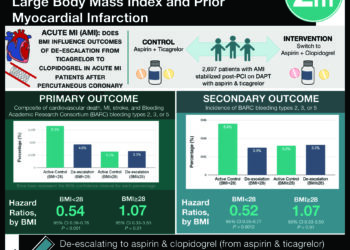Use of weight reduction interventions for overweight and obese patients limited in UK primary care
1. Most overweight and obese patients had not received weight reduction interventions according to primary care electronic records.
2. The most common weight reduction intervention in the primary care setting for overweight and obese patients was lifestyle advising, compared to prescription anti-obesity drugs for morbidly obese patients.
Evidence Rating Level: 2 (Good)
Study Rundown: Studies have shown that weight reduction interventions in primary care settings can be effective at managing obesity. The authors of this study aimed to examine the use of weight management interventions (e.g. lifestyle counseling, referral for weight management or bariatric surgery, prescription drugs) by primary care physicians in the United Kingdom (UK). They found that the large majority of overweight and obese patients had no record of receiving a weight reduction. The most commonly recorded intervention for overweight and obese patients was lifestyle counseling. Among morbidly obese patients the most common intervention was use of prescription drugs. Interestingly, no significant differences were found in weight change over 5 years among patients who received any of the three interventions types.
This study had a strong study design as it used a sample size of over 90,000 patients from the largest primary care database in the world. It supports a previous survey-based study that found limited use of obesity management interventions in the UK primary care setting. A notable limitation is that access to weight loss interventions was determined using electronic medical records, which are not always accurate as the study also found significant variation among primary care office documenting practices. Overall, the results reinforce previous findings of missed opportunities for weight loss interventions in the primary care setting. Efforts to increase access to weight management services in the primary care arena may be an effective public health strategy to combat obesity.
Click to read the study in BMJ Open
Relevant Reading: Effectiveness of primary care-relevant treatments for obesity in adults: a systematic evidence review for the U.S. Preventive Services Task Force
In-Depth [retrospective cohort]: Records of 91,413 individuals between age 30-100 and a BMI ≥ 25 were randomly selected from the Clinical Practice Research Datalink, the largest primary care database in the world based in the UK. All patients were registered with a primary care practice for at least one year between 2005 and 2012. Patient weights were classified according to World Health Organization classifications of BMI (overweight 25-29.9, obese 30-34.9, severe obesity 35-39.9, and morbid obesity ≥ 40). Medical record codes were examined to determine the use of weight management interventions. The cohort consisted of 60% overweight and 40% obese patients. The median proportion of patients who received a weight management intervention was 12%. Those with lower BMI were less likely to receive an intervention; for example, of the women in the study, the rate of no treatment ranged from 58% among morbidly obese patients to 90% among overweight patients. This relationship was confirmed with a multivariable analysis, which found that BMI category was the most strongly associated with weight loss intervention (hazard ratio 3.67, CI95% 3.45-3.92 for morbid obesity). Older age, female gender, depression, type 2 diabetes, former smoking status, and low socioeconomic status were also associated with weight management treatment.
More from this author: Unhealthy food cues prominent in children’s programming in the UK and Ireland, BCG vaccine protective against active tuberculosis in children, U.S. firearm fatality rates differ by state, race, and ethnicity, Smokers’ support for plain tobacco packaging linked to desire to quit, UK primary care physicians frequently prescribing antipsychotics for non-psychotic disorders
Image: PD
©2015 2 Minute Medicine, Inc. All rights reserved. No works may be reproduced without expressed written consent from 2 Minute Medicine, Inc. No article should be construed as medical advice and is not intended as such by the authors, editors, staff or by 2 Minute Medicine, Inc.






